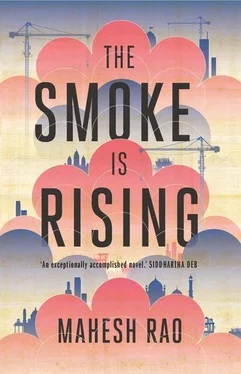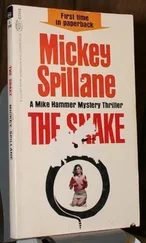As the metropolitan contours of Mysore shifted, Anand’s entrepreneurial vision tapered to a fine point. The friend was discarded and the partnership transformed itself into Anand and Co, later Exospace Media, a company that sought to requisition all of Mysore’s outdoor territory for its huge commercial canvas. Nothing was safe from Anand’s keen gaze: bus shelters, station platforms, roadside banners and street dividers. As the months went by, park railings, tree guards, gantries on construction sites and mobile phone masts were all commandeered for his business strategy. Some years ago, in a pioneering coup for the city, he had negotiated the use of one side of a private apartment block to sell life assurance; the apartment owners’ association had resisted the move strongly until the financial rewards had been fully elucidated.
While Anand supplied limitless perspicacity and drive, he was assisted by a team of skilful affiliates. Carefully cultivated contacts at the civic administration headquarters meant that all relevant licences and certificates of compliance were issued whenever required. A couple of associates at the Mysore Regeneration Council kept him fully informed with regard to developments to the city’s landscape. A number of his well-wishers in the city’s network of organised criminals ensured that the small-time operators putting up illegal hoardings were encouraged to consider other vocations.
A disgruntled hoarding owner had observed: ‘G S Anand is shameless. If his wife is looking the other way, he will even try and put an advertisement on her bare buttocks.’
As the traditional out-of-home advertising market in Karnataka became saturated, Anand, taking his cue from the big players in Mumbai and Delhi, hitched his wagon to the new technologies that offered greater rewards. By then he had moved into the first of his bungalows in Yadavagiri and felt it unbecoming that he should be considered the type of person who would have his mobile phone number daubed on a roadside sheet of metal. His company moved into the production of customised digital advertising screens at train stations and interactive displays for shopping malls, cinemas and exhibitions. His latest flagship project was a complex system of interlocking panels that would flash the benefits of a mobile phone network to commuters from the side of a planned flyover. He had also recently managed to net a lucrative contract to install digital advertising monitors in all the lifts in Mysore’s newest private hospital. The next stage in his career had only just begun. There were still entire ranges of products that the middle classes were completely unaware that they required; Anand was putting in place all the architecture he needed to communicate the necessary messages effectively and profitably.

The first that Susheela had heard of this business was in an article in Scope , headed ‘Silver sweethearts: Second time round for seniors’. Apparently the trend was increasingly noticeable; or rather, had been noticed by one Vaishali Mehta, deputy features editor of the magazine. Older men and women were striking out again, refusing to disappear into their newspapers and knitting. If Ms Mehta were to be believed, most of the coffee shops in Delhi and Bangalore were occupied by septuagenarians on their third dates. The Internet, it seemed, had liberated an entire generation of metropolitan seniors who could now invite romance and marriage back into their lives. The article made it sound like no park bench was safe, no restaurant out of bounds and no theatre free from the triumphant cries of carousing pensioners.
Susheela had always assumed that dating and matrimonial websites were only for youngsters and perverts. Now her curiosity was piqued. A handful of online searches showed her that a fair number of seniors were locked in a lamentable bid to reclaim their youth. Apparently there was no humiliation that they would not endure in an attempt to turn back the clock. Susheela jammed her reading glasses further up the bridge of her nose: some of these characters were even older than her.
On one website a sixty-six-year-old individual who called himself Avinash stated that his wife Brinda had passed away three years ago. Surely these people would not use their real names? Avinash claimed to have a deep interest in philosophy and stressed that his family members were all highly educated professional people, living all over the globe. He also bore more than a passing resemblance to the old Hindi film villain Pran. Avinash was seeking a well-educated wife or companion, slim or slender, between the ages of thirty-five and fifty. Susheela could only presume that none of Avinash’s erudite, internationally settled relatives had access to the Internet.
She clicked on another photo. Narendra, aged sixty-eight, from Bangalore, had felt the need to include a lengthy description of his career trajectory in the medical equipment manufacturing industry. He was divorced. His wife, he stated, had ‘indulged in some unruly behaviour at the express instigation of her family members and others,’ the consequences of which were fairly apparent. Narendra was looking for a Hindu wife who would be pleasant by nature, devoted and adaptable.
At what point had so many people taken leave of their senses? One man proclaimed with no shame that he was working in Afghanistan and wanted his future wife to accompany him there. As if it was not enough that the unfortunate woman would have all her husband’s details advertised across cyberspace, this man wanted to take her to a place where she would be mercilessly abused by the Taliban. Of course, there were a number of seemingly normal older men who looked perfectly well meaning. Yet some temporary mania had sent them all scurrying off to find wives when they could barely stand up unassisted.
Susheela turned her attention to the women. There seemed to be a number of Anglo-Indian women in their sixties seeking husbands, a fact which did not surprise her. One Bengali woman’s profile had been created by her daughter who claimed to be speaking on her behalf. Was the poor woman even aware of the existence of this website or would her daughter simply present her with a long line of geriatric suitors one day, a swayamvar for the superannuated? At least many of the women had seen fit to refrain from publishing their photos. Susheela did, however, spot one very decent-looking lady in a Kanjeevaram sari with a gentle smile. Meena lived in Mumbai and stated that she was looking for a ‘second innings’ with a caring man who would respect her independence. How had her family allowed her to get involved in such things? Susheela heard the phone ring and quickly logged off, her thoughts still fixated on Meena. She really hoped she would not end up with that man in Afghanistan.

‘So what news in the world of power supply? More load-shedding? There will have to be since the rains are late this year,’ observed Anand, pouring himself a beer. ‘You’re sure you don’t want one?’
Girish shook his head.
‘Well, if the population goes on increasing and demand keeps going through the roof, what can anyone do? No increase in supply will be able to keep up,’ said Girish sourly.
‘What you people need to do is stop giving those farmers all that free electricity. At least you will improve your revenue streams and be able to invest in capacity.’
‘Not all farmers get free electricity.’
‘The ones who don’t just stick their line anywhere and steal it. And you people take no action, the police take no action, no one does anything. If it were up to me, I would have a few of their leaders thrown in jail and see how much power they can steal after that.’
Читать дальше













